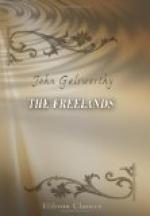On leaving the little humanitarian, Felix drifted back toward the court. The cars were gone, the groups dispersed; alone, leaning on his stick, the old, dark-whiskered man stood like a jackdaw with a broken wing. Yearning, at that moment, for human intercourse, Felix went up to him.
“Fine day,” he said.
“Yes, sir, ’tis fine enough.” And they stood silent, side by side. The gulf fixed by class and habit between soul and human soul yawned before Felix as it had never before. Stirred and troubled, he longed to open his heart to this old, ragged, dark-eyed, whiskered creature with the game leg, who looked as if he had passed through all the thorns and thickets of hard and primitive existence; he longed that the old fellow should lay bare to him his heart. And for the life of him he could not think of any mortal words which might bridge the unreal gulf between them. At last he said:
“You a native here?”
“No, sir. From over Malvern way. Livin’ here with my darter, owin’ to my leg. Her ’usband works in this here factory.”
“And I’m from London,” Felix said.
“Thart you were. Fine place, London, they say!”
Felix shook his head. “Not so fine as this Worcestershire of yours.”
The old man turned his quick, dark gaze. “Aye!” he said, “people’ll be a bit nervy-like in towns, nowadays. The country be a good place for a healthy man, too; I don’t want no better place than the country—never could abide bein’ shut in.”
“There aren’t so very many like you, judging by the towns.”
The old man smiled—that smile was the reverse of a bitter tonic coated with sweet stuff to make it palatable.
“’Tes the want of a life takes ’em,” he said. “There’s not a many like me. There’s not so many as can’t do without the smell of the earth. With these ’ere newspapers—’tesn’t taught nowadays. The boys and gells they goes to school, and ’tes all in favor of the towns there. I can’t work no more; I’m ’s good as gone meself; but I feel sometimes I’ll ’ave to go back. I don’t like the streets, an’ I guess ’tes worse in London.”
“Ah! Perhaps,” Felix said, “there are more of us like you than you think.”
Again the old man turned his dark, quick glance.
“Well, an’ I widden say no to that, neither. I’ve seen ’em terrible homesick. ’Tes certain sure there’s lots would never go, ef ’twasn’t so mortial hard on the land. ‘Tisn’t a bare livin’, after that. An’ they’re put upon, right and left they’re put upon. ’Tes only a man here and there that ’as something in ’im too strong. I widden never ’ave stayed in the country ef ’twasn’t that I couldn’t stand the town life. ‘Tes like some breeds o’ cattle— you take an’ put ’em out o’ their own country, an’ you ’ave to take an’ put ’em back again. Only some breeds, though. Others they don’ mind where they go. Well, I’ve seen the country pass in my time, as you might say; where you used to see three men you only see one now.”




